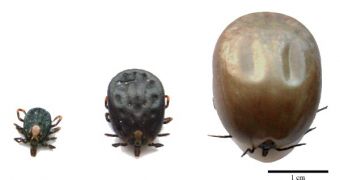They say that sex helps you burn calories and get in shape. But if we look at the female ticks, we could see how after mating, they grow from as big as a sand grain to the size of a large bean.
The ixodid female ticks experience an astonishing 100 times weight increase after mating!
Dr. Reuben Kaufman, from the Department of Biology at University of Alberta, was interested in finding out what causes such a massive weight increase, a record amongst blood-sucking creatures. He compared the ticks with blood-sucking insects: mosquitoes, tsetse flies, bed bugs and kissing bugs (ticks are not insects, but arachnids, related to spiders and scorpions). None of these insects gains such a weight.
Kaufman found in the case of the ixodid ticks an extremely different lifestyle from vampire insects. Ticks stay sucking on their hosts for days, not minutes and need about 6-10 days to reach the huge size. And the massive weight gain does not occur in the case of virgin females.
"In this family of ticks, mating takes place on the host. Most other arthropods mate before or after their brief blood meal -the two acts are totally separate, but not with these ticks." said Kaufman.
In a first phase, when the female tick attaches to the host, she experiences a rapid 10 times weight increase and stops. After she copulates, another 10 times increase follows. The virgin ticks rarely overpass the critical weight required for laying eggs.
"It will hang on to the host for weeks, waiting for a male to find her," said Kaufman.
An overweight virgin female could not reattach herself to a host, if groomed off.
"However, if she remains small she still has a chance to reattach itself to another host-hopefully infested with some feeding males-- continuing feeding and potentially mate. If a male eventually copulates with her, she will engorge normally and then be able to lay eggs. This is one reason why it might be adaptive for the virgin to remain small until mated."
Kaufman managed to detect in the male's seminal fluid two engorgement factor proteins that trigger the final massive engorgement in females.
A future anti-tick vaccine could employ these proteins, as tests have already suggested that mated ticks cannot fully engorge and thus reproduce, when ingesting the blood of a host that has been immunized against those proteins. An effective anti-tick vaccine could protect livestock and pets, as ticks, besides stealing you a blood amount, transmit some dangerous blood parasites on animals, related to malaria, but also the Lyme disease, a severe bacterial infection, in humans.

 14 DAY TRIAL //
14 DAY TRIAL //